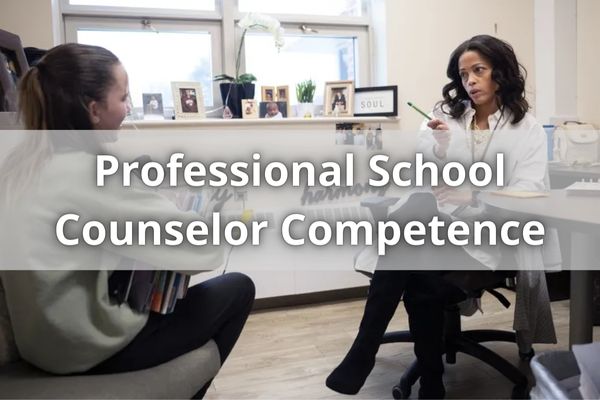School Counselor Standards: Inside Department Of Education
I have a duty to uphold certain school counselor standards in order to guarantee that I’m giving them the finest service possible. There are many components that make up these standards and each is essential for successful counseling services.
I’ll talk about the following in this piece: Professional competence, professionalism, ethical practices, respectful relationships, diversity & inclusion, self-care & wellness, professional development, knowledge of professional standards & practices, and technology & data-driven decision making
To offer their children the greatest help possible, counselors must fully comprehend each of these factors.
Professional School Counselor Competence

Professional competence is essential for providing effective guidance, allowing individuals to reach their highest potential. School counselor standards are a set of guidelines that provide the framework for professional school counselors in their work. Professional school counselors must have an understanding of the comprehensive school counseling program and the state department of education in order to provide quality services.
It’s important for professional school counselors to be knowledgeable and skilled in guidance and counseling techniques as well as other areas such as assessment, consultation, collaboration, advocacy, and research. In addition to knowledge and skills related to guidance and counseling services, there are ethical obligations that all professionals must adhere to when working with clients.
These include maintaining confidentiality, respecting diversity, being honest with clients about expectations or limitations of service delivery, avoiding dual relationships with clients or former clients, using appropriate language when communicating with colleagues or students/clients/families and being socially responsible when advocating on behalf of students/clients/families.
Adhering to these ethical obligations helps demonstrate professionalism which is key in gaining trust from those receiving services provided by professional school counselors.
School counselor standards also emphasize the importance of demonstrating strong leadership within the profession as well as taking part in continuing education opportunities related to best practices in guidance and counseling services. Leadership involves:
- advocating for advisory positions at schools or districts
- collaborating on projects related to student success
- participating on committees
- developing networks with local agencies
- engaging in professional organizations
- staying informed about current trends within the field
- mentoring new professionals entering into the field
- attending conferences or workshops related to best practices within guidance and counseling programs
- pursuing advanced degrees or certifications when available
Developing these leadership skills will help ensure quality service delivery across different settings where professional school counselors are found working today. Through their work toward meeting standards established by governing bodies like state departments of education or accreditation boards such as CACREP (Council for Accreditation Counselor Education Programs), professional school counselors demonstrate competency while providing effective guidance that leads individuals towards achieving their fullest potentials.
Professionalism
Being a professional in the field is essential – no shortcuts allowed! School counselors must adhere to standards of practice that include, among other things, professionalism. This means that counselors must maintain an appropriate level of decorum and demeanor when interacting with students, staff members, and families. It also means they need to stay current on relevant topics related to their profession and develop skills for implementation within their counselor program.
Professionalism requires school counselors to create a safe learning environment for improving students by adhering to ethical practices. Additionally, it includes developing career development plans for educators as well as participating in educator evaluation system processes. Professionalism also requires self-reflection about our own biases and beliefs which can impact how we interact with those seeking our support.
We must be aware of what information is shared externally and internally within the school or district setting and ensure confidentiality in all interactions with clients. Furthermore, it’s imperative that all communication regarding student issues be conducted in the most respectful manner possible while also providing accurate advice related to their specific situation or concern.
School counselors should strive to uphold the highest professional standards when engaging with colleagues and community members alike as they work diligently towards helping each student reach his/her fullest potential through individualized counseling services within the professional school context. The importance of maintaining professionalism cannot be understated as it ensures quality counseling services are provided which will ultimately lead to improved outcomes for those whom we serve – our students!
Ethical Practices In Comprehensive School Counseling Program
You must maintain ethical practices when interacting with those seeking your support in order to provide quality services and improved outcomes for your clients. As a school counselor, it is my responsibility to adhere to the standards set forth by the American School Counselor Association (ASCA).
These ethical practices include delivering counseling services that are based on research-supported interventions, engaging in professional development, adhering to all laws governing mental health practitioners and providing guidance and instruction within the scope of practice of school counseling.
Additionally, I must take into consideration cultural differences when working with students from diverse backgrounds. This includes understanding individual differences regarding language barriers, religion, sexual orientation, gender identity expression and more. Furthermore, as a school counselor I have an obligation to use evaluation results appropriately and ethically protect confidential information from being shared without consent.
By being conscious of my behavior, I am able to establish respectful rapport with my pupils and assist them in acquiring the abilities required for success both inside and beyond the classroom. This thus fosters a welcoming environment that is favorable to learning, which over time may result in beneficial behavioral and academic changes.
Respectful Relationships
Developing respectful relationships with clients is essential for providing quality services and improved outcomes. As a school counselor, I work hard to foster a climate of trust and respect in my office so that kids feel at ease talking about their possibilities for professional and technical education, graduation goals, and other topics.
I think it’s critical to approach each student with the proper mindset and to appreciate the particular qualities they bring to our discussions in order to establish this connection. While working with children one-on-one and in small groups, I also place a priority on cooperation with teachers, parents, and guidance counselors.
Being able to create a space where conversations about sensitive topics can be had openly also requires me as a school counselor to value diversity & inclusion in the school community. This means understanding different cultural backgrounds when working with students from diverse backgrounds; it also implies being mindful of important differences such as race or gender when talking about meaningful experiences such as college admissions or job searches.
Creating a culture of acceptance and respect begins by listening intently during sessions with clients—making sure their voices are heard—and continuing outside of these sessions by advocating for their best interests. From there, I work to ensure that all involved parties are fully aware of any decisions made on behalf of the student so everyone’s expectations are clear moving forward into further discussions about diversity & inclusion.
Diversity & Inclusion

Understanding and appreciating diversity and inclusion is essential for creating an inclusive environment in any setting. As a school counselor, I strive to find ways to make sure that every student has access to the same resources regardless of their background or identity.
This means utilizing comprehensive school counseling programs that are designed to promote equity and equality among all students. Through assessment, I can identify needs in order to provide appropriate support services tailored for each student’s needs. Curriculum also plays a role in helping create an inclusive atmosphere as it should reflect the experiences of all students present in the school.
My role as a school counselor doesn’t end with curriculum design; it extends into advocating for diversity and inclusion within my school community. This can entail collaborating with administrators, educators, parents, and other interested parties to develop programs that honor our different origins while also giving everyone access to the resources they need to achieve academically and socially.
It’s crucial to build strong bonds with individuals around me so that I can more effectively speak up for others who might be unable to do so on their own due to access issues or language challenges. I’m committed to fostering an environment where every person is accepted while at the same time challenging biases that exist within society today.
Through this commitment, we can work together towards building a more equitable world where everyone feels safe, respected, appreciated, and included, no matter their differences or similarities. Moving forward, it’ll take continued effort from myself along with others in order to create lasting change through advocacy and collaboration.
Advocacy & Collaboration
You can help create lasting change through advocating for diversity and inclusion, as well as collaborating with others to do the same. As a school counselor, this means utilizing counseling services that support diverse groups of students and their unique needs, such as the Guidance for Youth Success Through Behavioral Education and Resources (GYSBERS) program.
It also means understanding the American School Counselor Association (ASCA) National Model and how it applies to your work, and advocating on behalf of all students in the school district.
Collaboration is key when it comes to advocating for diversity and inclusion. By working with other professionals in the school district, such as administrators, teachers, and parents, you can gain feedback on what’s working or not working with regard to diversity initiatives. This allows you to add more insight into conversations about any changes that need to be made in order for all students feel included within their educational environment.
Advocating for diversity goes beyond simply talking about it; taking action is necessary in order to make meaningful progress towards creating an equitable learning space for all students. This includes examining current counseling services available at your school district level—and making sure they are accessible—as well as engaging in conversations around how policies affect different student populations differently. From there, you can advocate for policies that promote accessibility and inclusion for all learners.
Accessibility & Inclusion
By being aware of the needs and perspectives of all students, you can ensure that everyone has access to equitable educational opportunities and is included in the school community. School counselors play an essential role in fostering a positive school climate where accessibility and inclusion are prioritized. To accomplish this, they must:
- Create an environment that encourages open dialogue and provides support for diverse populations
- Utilize inclusive language when communicating with students
- Encourage student engagement through active listening
- Recognize individual differences among students
School counselors must also strive to promote total educational development by understanding the implications of cultural differences on student learning. This will help create a more welcoming school climate for all members of the school community.
In order to further increase access to education, it’s essential that school counselors remain aware of legal requirements related to accessibility as well as any other laws and regulations that may affect their work. By doing so, they can help make sure that all students have equal access to resources regardless of their socioeconomic status or identity.
With these steps in place, school counselors can foster a culture of acceptance, tolerance, and inclusion within their schools. Transitioning into self-care and wellness then becomes easier for them while also providing greater support for their students.
Self-Care & Wellness
Following the discussion on accessibility and inclusion for school counselors, I’d like to now discuss self-care and wellness. As a caring adult, it is important to be responsive to the needs of students, but also for us as professionals. The most effective counseling requires us to practice self-care in order to remain healthy and well balanced.
| Keywords | Definition | Benefits |
| Self-Care | Caring for oneself through proactive measures such as rest, nutrition, exercise etc. | Reduced stress levels and improved mental health wellbeing |
| Wellness | State of physical, mental/emotional and spiritual health | Increased productivity and general satisfaction with life |
| Caring Adult | Responsive individual who demonstrates care towards others | Improved engagement with students leading to better learning outcomes |
| Responsive | Being alert or quick in understanding or reacting | Improvement in communication skills which positively impact relationships |
By engaging in regular self-care activities such as exercise or taking breaks throughout the day, we can become more resilient when faced with stressful situations that come up throughout our multiyear professional career. Additionally, setting aside time each day dedicated solely to ourselves helps build a strong sense of wellness over time.
This allows us to be present both personally and professionally while providing quality attention and guidance for our students. When implemented regularly, these strategies can help develop a strong foundation for professional development later on down the line.
Academic Professional Development

Continuing to invest in our own professional development is essential for providing quality counseling services and maintaining a healthy work-life balance. As school counselors, this requires us to stay abreast of the latest personnel practices, competency standards, and endorsement requirements at both the postsecondary and K-12 levels.
We should also strive to use a variety of resources such as educational materials, articles, workshops, online courses or webinars, or even consultation with colleagues to ensure that we are meeting these standards. Professional development offers an opportunity for school counselors to broaden their knowledge base while improving their skillset and increasing their confidence in delivering best practice services.
Whether it’s attending conferences or joining professional organizations related to school counseling, it’s important that we continue to explore new strategies that can help us better serve our students. Making time for self-care activities like yoga or journaling can also be part of our professional growth journey as it allows us space for reflection and renewal so that we may remain motivated.
In order to be effective practitioners who promote student success, school counselors must have a thorough knowledge of professional standards & practices. From ethical guidelines set by organizations like the American School Counselor Association (ASCA) Code of Ethics to state laws governing counselor licensure and certification requirements – staying informed on the scope of practice is key.
Moreover, understanding local policies regarding student confidentiality as well as other relevant rules around data protection helps maintain trust between students and adults in the classroom setting. All these elements form part of a comprehensive framework which ensures high quality service delivery throughout all areas within a school district’s organizational structure.
In addition, having access to support from peers and administrative staff can make all the difference when navigating complex situations involving students. Establishing strong relationships with teachers and parents through open communication channels leads not only strengthens collaboration but can also reduce stress levels when faced with difficult decisions such as interventions for at-risk youth or dealing with challenging family dynamics due to socio-economic circumstances outside one’s control.
Investing in ourselves through continuing education programs combined with creating meaningful connections within our communities are vital steps towards being successful professionals who are dedicated advocates for children’s emotional wellbeing needs. To move forward in this topic area then, developing further understanding about knowledge of professional standards & practices is necessary in order for us grow into competent counselors who are able serve others effectively.
Knowledge Of Professional Standards & Practices
Having an understanding of professional standards and practices is essential for a school counselor. As part of my ongoing professional development, I’m committed to staying up-to-date on our department’s standard procedures. This allows me to improve the learning environment for students in the educational setting.
The purpose of these standards is to ensure that all school counselors are held accountable and that they have a clear understanding of their role in the educational system. Adhering to these standards helps me develop effective strategies when working with students and managing difficult situations. It also allows me to provide guidance that follows ethical guidelines set by my profession.
To stay current, I take courses periodically related to professional standards and practices so I can better understand how it applies directly to my work as a school counselor. This knowledge helps me remain cognizant of which techniques are most effective for different types of student needs while providing support in various areas such as academics, emotional health, career counseling, etc.
In addition, this information ensures I am able offer the highest quality service possible when striving for improved outcomes for all students – allowing them greater success both now and in the future. With this necessary foundation firmly established, it’s time to explore how technology and data-driven decision making can be used by school counselors today.
Technology & Data-Driven Decision Making

Utilizing technology and data-driven decision making, I’m able to provide even more tailored approaches for students’ needs, allowing them to reach their full potential. Through this approach as a school counselor, I’m better able to enhance academic outcomes. By utilizing data-driven models that provide insight into student performance and behavior, I can determine the best strategies to help students reach their goals.
Data-driven decision making allows me to track each student’s progress in real time and provides evidence on how interventions have impacted the outcome of any given individual or group of students. This tracking helps me to make more informed decisions about my practice and create successful programs that benefit all students.
Technology has made it easier for counselors to access important information quickly, providing guidance for developing effective interventions that meet the individual needs of each student. Not only does this allow me to provide quality services, but it also helps me create successful programs that benefit all students.
With technology and data-driven decision making at my disposal, I’m confident that I can continue providing quality services with an eye towards continued success for all my students.
Conclusion: What Are School Counselor Standards?
As a school counselor, I strive to uphold the highest standards of professional competence, professionalism, and ethical practices. I am committed to building respectful relationships and promoting diversity and inclusion. Taking care of my own wellness is also a priority, as is continually developing my knowledge of professional standards and practices.
To effectively support students, it is important for me to stay up-to-date with advances in technology and data-driven decision making. By doing so, I can tailor my support to meet each student’s unique needs. Ultimately, my goal is to empower each student to reach their full potential.







